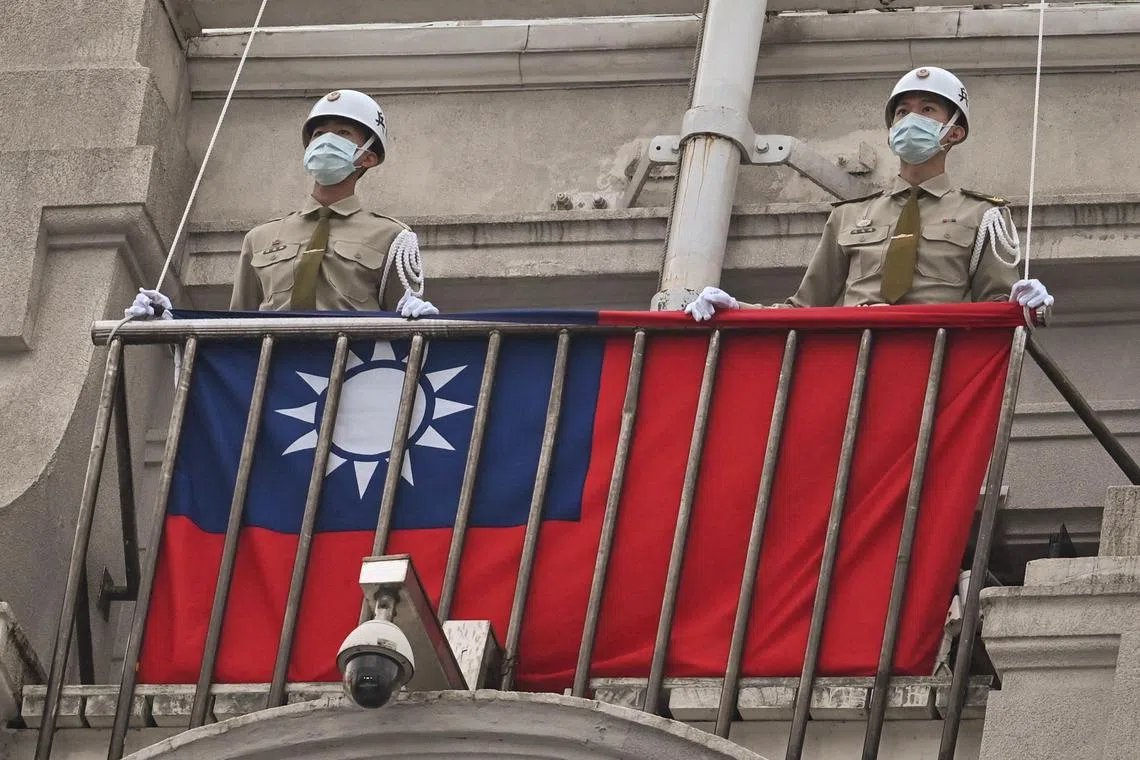Moves by US Congress to strengthen Taiwan, confront China spell rockier relations ahead
Sign up now: Get ST's newsletters delivered to your inbox

The US Bill would authorise grant assistance for Taiwan of up to US$2 billion a year from 2023 through 2027.
PHOTO: AFP
Follow topic:
WASHINGTON - The United States House of Representatives on Thursday passed an omnibus military spending Bill with weapons funding for Taiwan and other programmes to help the island withstand pressure from Beijing, spelling choppier waters ahead for US-China relations.
The National Defence Authorisation Act (NDAA) contains the Taiwan Enhanced Resilience Act, which authorises up to US$10 billion (S$13.5 billion) in security assistance to Taiwan over the next five years and fast-tracks its weapons procurement.
The Bill also has provisions to counter China’s coercion of countries that increase their support for Taiwan, and promote Taipei’s inclusion in international organisations.
Beijing said it is “firmly opposed” to the US using the Bill to pass “negative content related to China”, Chinese Foreign Ministry spokesman Mao Ning told reporters after the Bill was passed.
China views Taiwan as a renegade province to be reunited with it, and has not ruled out using force to do so if necessary.
Top US lawmakers welcomed the 350-80 passage of the annual must-pass Bill, which funds the Pentagon’s spending. It will next go to the Senate, where it is expected to pass, before President Joe Biden can sign it into law.
“This national defence Bill will be one of the most consequential in years… for setting the theatre for real deterrence by implementing a more resilient strategy for Taiwan should China continue pursuing a collision course towards war,” said Senate Foreign Relations Committee chairman Bob Menendez, a chief architect of the legislation’s earlier iteration, the Taiwan Policy Act.
Some of its controversial clauses, such as designating Taiwan a “major non-Nato ally” and unofficially elevating the status of the US envoy to Taiwan, were dropped over concerns they could provoke Beijing and were more symbolic than substantive.
Still, there is little sign that US-China relations are going to improve much, Columbia University international relations don Thomas Christensen said on Thursday at a Centre for Strategic and International Studies webinar on ties between the United States, Taiwan and China.
He added: “The NDAA has lots of clauses from the earlier Taiwan Policy Act that will be considered abrasive in Beijing on cross-strait relations.”
On Thursday, the incoming Republican majority in the House also touted the new committee they plan to set up to investigate China and appointed a vocal China critic, Mr Mike Gallagher, as its chairman.
The committee’s focus will be to “expose and fight against the Chinese Communist Party’s cyber, trade and military threats against America”, said Republican leader and front runner for House speaker Kevin McCarthy.
Mr Gallagher, a former counter-intelligence officer with the US Marines, recently introduced a Bill to force public pension plans and other tax-exempt entities to divest from Chinese companies, called the Dump Investments in Troublesome Communist Holdings (Ditch) Act.
He has also championed a national ban on Chinese-owned app TikTok, which he called “digital fentanyl” that is “addicting our kids”.
On Tuesday, Mr Gallagher responded to his appointment with a statement accusing the Chinese government of committing genocide, obscuring the Covid-19 pandemic’s origins and threatening Taiwan. “The greatest threat to the United States is the Chinese Communist Party (CCP),” he said.
“The select committee will push back in bipartisan fashion before it’s too late. Even in a divided government, we have an opportunity to build a united front against CCP aggression.”
American Enterprise Institute non-resident fellow Eric Sayers said that while the committee would not focus on producing legislation, it would shine a spotlight on those issues and serve as a “big microphone” for lawmakers from both parties to discuss them in high-profile hearings.
The selection of Mr Gallagher, who has a track record of working with Democrats, also signals that Mr McCarthy wants a “bipartisan effort” when it comes to China, Mr Sayers added.
White House Indo-Pacific coordinator Kurt Campbell, however, predicted that there would be “a resumption of some of the more practical, predictable elements of great-power diplomacy” between the two superpowers.
Speaking at the Aspen Security Forum on Thursday, he said Beijing is interested in more predictable ties with Washington in the “short term”, as it grapples with domestic challenges and regional tensions.
“They want a degree of predictability and stability, and we seek that as well,” said Dr Campbell.

